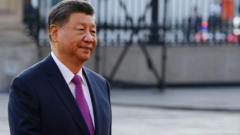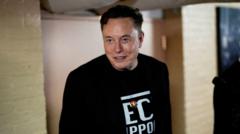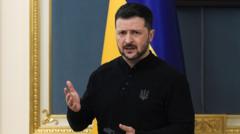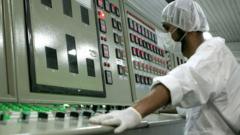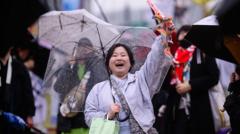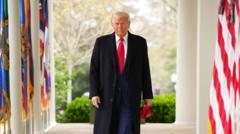The introduction of a 10% tariff on all imports has ignited protests, market downturns, and retaliatory measures from affected countries, particularly China.
Trump Calls for Resilience Amidst New 10% Tariffs as Global Markets React
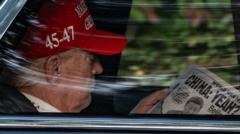
Trump Calls for Resilience Amidst New 10% Tariffs as Global Markets React
President Trump encourages Americans to remain steadfast as tariffs take effect, prompting worldwide economic responses.
In a bold move that has sent reverberations through global markets, the United States began implementing a 10% "baseline" tariff on all imports this weekend. President Donald Trump called on Americans to "hang tough," urging them to endure the economic turbulence that has accompanied this policy shift. His statements come in light of significant market declines, with the S&P 500 observing its worst weekly performance since 2020, which saw a drop of nearly 6%.
With the new tariffs now in place, nations including the UK and France have expressed concerns over a potential trade war, instructing their leaders to keep all options on the table. China has reacted strongly to the tariffs, announcing retaliatory measures that are expected to impose significant financial strains on American exports.
Trump described the ensuing market volatility as an “economic revolution,” claiming the U.S. would eventually emerge victorious from this upheaval. In a post on Truth Social, he stated, “Hang tough, it won't be easy, but the end result will be historic.” This assertion comes as economists predict that these changes will disrupt global supply chains and influence international trade relations for years to come.
Crucially, billionaire Elon Musk, an ally of Trump and head of the Department of Government Efficiency (Doge), suggested the potential for a "zero-tariff situation" between the U.S. and Europe, which could bolster trade efficiency and create a cohesive free-trade zone. His comments coincided with planned tariffs that may escalate up to 50% against certain countries deemed problematic for U.S. interests.
In the UK, the FTSE 100 plummeted by almost 5%, marking its steepest decline in over five years, while other Asian and European markets followed suit. British Prime Minister Sir Keir Starmer held discussions with world leaders in response to the tariffs, underscoring the urgency of the situation. Starmer and French President Emmanuel Macron emphasized that a trade war would have widespread implications for global economic security, especially affecting regions such as South East Asia.
Amidst this backdrop, notable protests are planned across the United States, with approximately 1,200 demonstrations anticipated as citizens voice their discontent over Trump’s policies and the burgeoning economic divide. Although the White House remained tight-lipped regarding the protests, a recent photograph showed Trump perusing an article concerning China, hinting at his ongoing engagement with the issue.
The economic fallout from these tariffs has already begun to surface, with Jaguar Land Rover announcing a suspension of shipments to the U.S. while they reassess the new trading landscape. As the dust settles from these policy changes, the global trading community remains on high alert, watching how this economic and diplomatic saga will unfold.
With the new tariffs now in place, nations including the UK and France have expressed concerns over a potential trade war, instructing their leaders to keep all options on the table. China has reacted strongly to the tariffs, announcing retaliatory measures that are expected to impose significant financial strains on American exports.
Trump described the ensuing market volatility as an “economic revolution,” claiming the U.S. would eventually emerge victorious from this upheaval. In a post on Truth Social, he stated, “Hang tough, it won't be easy, but the end result will be historic.” This assertion comes as economists predict that these changes will disrupt global supply chains and influence international trade relations for years to come.
Crucially, billionaire Elon Musk, an ally of Trump and head of the Department of Government Efficiency (Doge), suggested the potential for a "zero-tariff situation" between the U.S. and Europe, which could bolster trade efficiency and create a cohesive free-trade zone. His comments coincided with planned tariffs that may escalate up to 50% against certain countries deemed problematic for U.S. interests.
In the UK, the FTSE 100 plummeted by almost 5%, marking its steepest decline in over five years, while other Asian and European markets followed suit. British Prime Minister Sir Keir Starmer held discussions with world leaders in response to the tariffs, underscoring the urgency of the situation. Starmer and French President Emmanuel Macron emphasized that a trade war would have widespread implications for global economic security, especially affecting regions such as South East Asia.
Amidst this backdrop, notable protests are planned across the United States, with approximately 1,200 demonstrations anticipated as citizens voice their discontent over Trump’s policies and the burgeoning economic divide. Although the White House remained tight-lipped regarding the protests, a recent photograph showed Trump perusing an article concerning China, hinting at his ongoing engagement with the issue.
The economic fallout from these tariffs has already begun to surface, with Jaguar Land Rover announcing a suspension of shipments to the U.S. while they reassess the new trading landscape. As the dust settles from these policy changes, the global trading community remains on high alert, watching how this economic and diplomatic saga will unfold.


